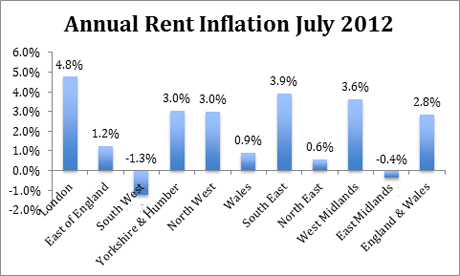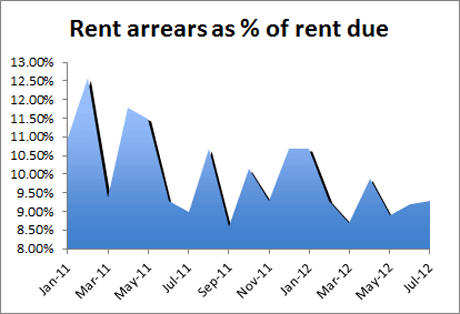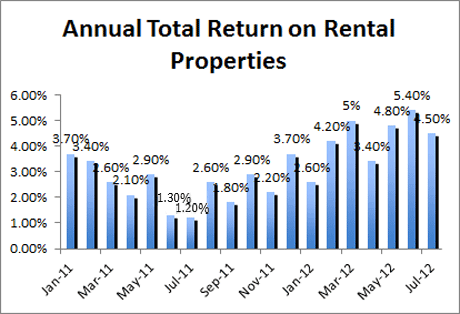Rising rents are a red flag for the property market
Rents on British properties are at record highs. That's bad news for house prices. And don't even think of buying to let, says Phil Oakley. Here's why.
Get the latest financial news, insights and expert analysis from our award-winning MoneyWeek team, to help you understand what really matters when it comes to your finances.
You are now subscribed
Your newsletter sign-up was successful
Want to add more newsletters?

Twice daily
MoneyWeek
Get the latest financial news, insights and expert analysis from our award-winning MoneyWeek team, to help you understand what really matters when it comes to your finances.

Four times a week
Look After My Bills
Sign up to our free money-saving newsletter, filled with the latest news and expert advice to help you find the best tips and deals for managing your bills. Start saving today!
Rents hit a new record high in July according to the latest buy-to-let index from LSL Property Services. You might think that's good news. It might be for landlords. But for us, it's another symptom of the country's malfunctioning property market.
The average rent is now £725 per month according to LSL up 2.8% compared with a year ago. London continues to roar ahead but rents are not going up as fast as they were at the beginning of the year.
But rising rents are not something to cheer. For one thing it means that more people have less money to spend after they have paid for a roof over their head every month. We don't celebrate rising petrol prices. Will anyone be cheering when the price of bread starts going up soon because there isn't as much wheat around? Rising rents are just another squeeze on the cash flows of consumers. It's not what the UK economy needs right now.
MoneyWeek
Subscribe to MoneyWeek today and get your first six magazine issues absolutely FREE

Sign up to Money Morning
Don't miss the latest investment and personal finances news, market analysis, plus money-saving tips with our free twice-daily newsletter
Don't miss the latest investment and personal finances news, market analysis, plus money-saving tips with our free twice-daily newsletter

Source: LSL
But rising rents are telling us something else. They are telling us that houses still cost too much. The banks are scared of mortgages turning bad and don't want to give too much money to people wanting to buy houses at the moment. Hence the numbers of people renting is going up. The increased demand for rental properties is pushing up rents.
By extension you might think buy-to-let would be a good thing to get into right now? Actually, it's probably a very bad idea. I'll explain why.
The case against buy-to-let
First and foremost, look at where your income is coming from. If you were looking at a share with a decent dividend, you'd look at the ability of the company to keep paying it. You'd look at its profits and cash flows. The same bit of common sense applies to rental property. Can your tenant afford to pay the rent? With rents increasing faster than take-home pay, it stands to reason that for a lot of people, the monthly rent or mortgage payment is becoming harder to meet.

Source: LSL
That's why nearly 10% of all rents are currently overdue. Whilst not as high as the levels seen a couple of years ago, it's still a worrying number and it has been creeping up. At these levels, it makes a big dent in the returns you get from rental property. As Capital Economics notes in its recent housing market update, there is a risk that mortgage and by implication rental arrears increase as the growth in part-time working and underemployment squeezes more households.
But even if these issues didn't exist, the returns from property are abysmal and could get a lot worse. A few weeks ago, I calculated that buying a house with an average rental yield of 5.2% actually led to a cash loss when all relevant costs and voids were taken into account. That's not to say that landlords who have owned their properties for a long time aren't making good yields on their purchase costs many are.
But in my previous article above, I suggested that a new buyer with a 60% buy-to-let mortgage is losing cash every month. So why would they pay current house prices? Only with house prices considerably lower than they are now can buy-to-let make sense.
Put it this way, if I was borrowing money to invest in a rental property, I'd want at least 5% on my own money for the risks I'd be taking on. Otherwise, I'd just buy utility stocks or real estate investment trusts (REITS) and stick them in my Isa. So, if I want a 5% cash yield, with average rents of £725 per month - which is where they are now - I'd be looking to pay about £90,000 (see table below) for the average rental property or about 45% less than they cost now.
How the numbers work
What I am doing here is looking at my expected monthly cash flows from renting a house. The income side is simply rent less an assumption about how often the house is empty or rent isn't paid. I've assumed one month here (or 8.3% of annual rent), although the LSL figures suggest that this is nearly 10% in reality.
On the cost side, I look at typical costs such as insurance, letting agent fees and maintenance. Maintenance costs are likely to be lumpy. In some years you won't spend much. In other years, the boiler will need replacing or the house will need redecorating. The estimate of annual maintenance costs attempts to smooth these costs. I then take away mortgage costs on a buy-to-let repayment mortgage based on 60% loan-to-value at 5% for twenty-five years. Finally, income tax is deducted at 20%.
Based on these assumptions, the annual cash return on £36,000 of the investor's own money invested (40% of £90,000) is 5% after tax. By way of comparison, a cash buyer paying £90,000 would receive income after tax of £4,814, or a return of 5.3%.
| Monthly rent | £725 |
| Annual rent (£725 x 12) | £8,700 |
| UK average house price needed (see below) | £90,000 |
| Gross rental yield (annual rent / price needed) | 9.7% |
| Row 4 - Cell 0 | Row 4 - Cell 1 |
| Annual rent | £8,700 |
| Insurance premiums (2.5% of rent) | -£217.50 |
| Replacement / maintenance (10% of rent) | -£870.00 |
| Voids (1 month's rent) | -£750 |
| Agency fee (10% of rent) | -£870.00 |
| Mortgage costs 60% BTL @ 5% (capital and interest) | -£3,788.14 |
| Net income (rent minus costs) | £2,229.36 |
| Tax @ 20% | -£445.90 |
| Net income after tax | £1,783.50 |
| Owner's equity invested (40% of price) | £36,000 |
| So: return on owner's equity (£1,783/£36,000) | 5.0% |
I'm not saying that house prices are going to fall by 45%. But when I argue that UK house prices are significantly overvalued, the calculation above forms a large part of my case. Yes, you can quibble with some of the assumptions (see previous article) but when you are losing cash every month, do you really think that you are going to make capital gains on property at current levels? Who in their right mind would buy the house from you?
This is exactly the same flawed argument that was used to peddle worthless internet shares. History tells us that investing in something for capital appreciation without the support of a decent income stream usually ends in tears.
Every month, LSL gives the average total return for rental properties. This takes into account the returns from rents and changes in property value. At the moment the return is a pretty poor 4.5% per year (before tax) consisting of income of £7,763 (or £937 less than fully let indicating that voids are a serious issue) and a capital loss of £305.

Source: LSL
The rental market looks increasingly stretched. Rising rents make it harder for tenants to pay their monthly bills. Even with rents going up, new buy-to-let investors unless they are large cash buyers will lose money.
Only a sharp fall in house prices will address these problems. As I said last week, the sooner this happens, the better.

Recommended video
Tim Bennett looks at some of the most popular house price surveys and explains the differences between them, how they work, and how useful they are as a guide to house prices.
Get the latest financial news, insights and expert analysis from our award-winning MoneyWeek team, to help you understand what really matters when it comes to your finances.
Phil spent 13 years as an investment analyst for both stockbroking and fund management companies.
-
 Early signs of the AI apocalypse?
Early signs of the AI apocalypse?Uncertainty is rife as investors question what the impact of AI will be.
-
 Reach for the stars to boost Britain's space industry
Reach for the stars to boost Britain's space industryopinion We can’t afford to neglect Britain's space industry. Unfortunately, the government is taking completely the wrong approach, says Matthew Lynn